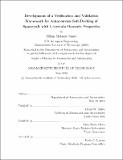Development of a verification and validation framework for autonomous soft-docking of spacecraft with uncertain dynamic properties
Author(s)
James, Jillian Melanie
DownloadFull printable version (16.13Mb)
Other Contributors
Massachusetts Institute of Technology. Department of Aeronautics and Astronautics.
Advisor
David W. Miller and Alvar Saenz-Otero.
Terms of use
Metadata
Show full item recordAbstract
Although soft-docking in space has been demonstrated in the past, these missions have required detailed information about the target vehicle for success, and often relied on manual control during the final stages. Autonomous docking, however, shows the potential to greatly reduce operation costs while accomplishing complex scenarios. Unfortunately, unknown dynamics and changing parameters stress current attitude control systems for docking applications such as spacecraft servicing, debris capture, and space robotics operations. Adaptation for example may assist with vehicle control under such conditions, however requires careful validation. Since autonomous soft-docking has limited heritage when there are system uncertainties, risk reduction prior to operation becomes very important for mission success. In this thesis a verification and validation framework was developed for autonomous soft-docking of spacecraft under such uncertainties. The approach combines risk-management techniques, simulation, Monte Carlo analysis, diagnostic tools and experimentation in the micro-gravity environment of the International Space Station (ISS) to create a comprehensive risk-reduction strategy. Development methods are described to provide general guidelines for design of future soft-docking missions. Additionally, this thesis explores how such verification and validation methods may be used to assess how an adaptive controller can maintain attitude control authority when a spacecraft joins with an object with limited physical parameter information. The goal is to chart a path for controller validation via future spaceflight experimentation. The risk reduction framework and controller analyses and tests are based on working with the Synchronized Position Hold Engage Reorient Experimental Satellite (SPHERES) facility at MIT and on the ISS.
Description
Thesis: S.M., Massachusetts Institute of Technology, Department of Aeronautics and Astronautics, 2016. This electronic version was submitted by the student author. The certified thesis is available in the Institute Archives and Special Collections. Cataloged from student-submitted PDF version of thesis. Includes bibliographical references (pages 125-128).
Date issued
2016Department
Massachusetts Institute of Technology. Department of Aeronautics and AstronauticsPublisher
Massachusetts Institute of Technology
Keywords
Aeronautics and Astronautics.